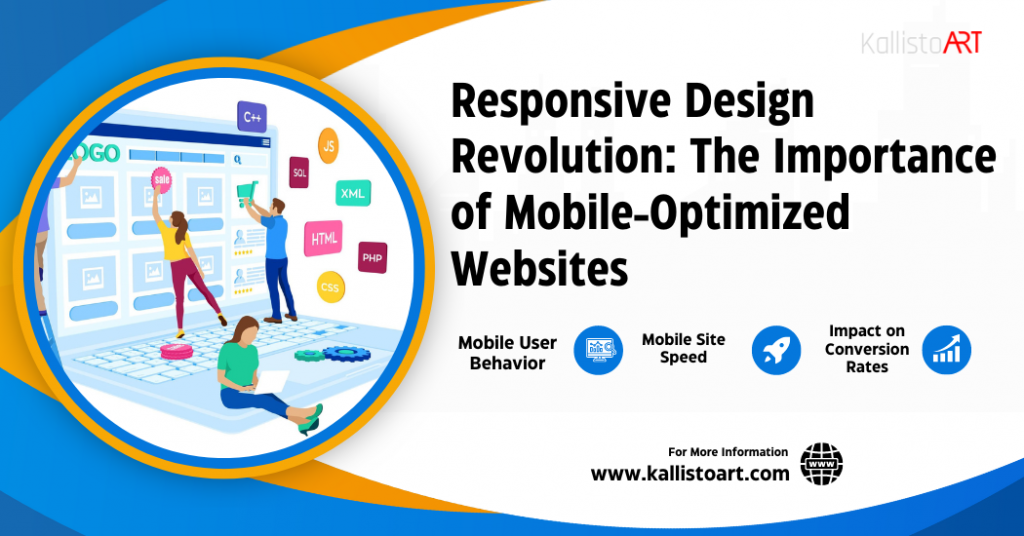Through Web Development to Increase Growth of your Businesses
 In today’s rapidly evolving digital landscape, the success of businesses hinges greatly on their online presence and engagement. With the advent of web development technologies, businesses now have an unprecedented opportunity to leverage the power of the internet to drive growth and success. In this comprehensive guide, we’ll explore how strategic web development can unlock new avenues for business expansion, optimize user experiences, and ultimately propel growth to new heights.
In today’s rapidly evolving digital landscape, the success of businesses hinges greatly on their online presence and engagement. With the advent of web development technologies, businesses now have an unprecedented opportunity to leverage the power of the internet to drive growth and success. In this comprehensive guide, we’ll explore how strategic web development can unlock new avenues for business expansion, optimize user experiences, and ultimately propel growth to new heights.
Overview of Web Development in Florida
In the dynamic digital landscape of Florida, a web development company plays a pivotal role in crafting online solutions that drive business success. A web development company in Florida specializes in creating and optimizing websites to meet the unique needs of local businesses and industries. These companies leverage cutting-edge technologies and industry best practices to design visually stunning, user-friendly websites that captivate audiences and elevate brands. From custom web design to responsive development and e-commerce solutions, a top-notch web development company in Florida is committed to delivering results that exceed client expectations and propel businesses to new heights in the competitive online marketplace.
Understanding Business Growth with Website Design
Understanding Business Growth involves recognizing the pivotal role that website design plays in driving success in the digital landscape. Effective website design goes beyond aesthetics; it serves as the cornerstone for attracting and retaining customers, optimizing user experiences, and ultimately fueling business growth. By crafting intuitive navigation, visually appealing layouts, and mobile-responsive interfaces, businesses can create immersive online environments that captivate audiences and inspire action. A well-designed website acts as a virtual storefront, showcasing products, services, and brand values while establishing credibility and trust with visitors. Moreover, website design influences search engine rankings, conversion rates, and customer satisfaction, making it a critical component of any growth strategy. In essence, understanding business growth entails recognizing the transformative power of website design in shaping the trajectory of a business’s online presence and market performance.
Unlock Your Business Potential with Our Expert Web Development Services! Contact the Premier Web Development Company in Florida Today!
Leveraging Web Development for Business Expansion
Leveraging Web Development for Business Expansion delves into the strategic utilization of web development tools and techniques to propel business growth and expansion. In essence, it focuses on how businesses can harness the capabilities of web development to reach new markets, engage with diverse audiences, and ultimately drive revenue generation.
Here’s a deeper exploration:
- Enhanced Online Presence: Web development empowers businesses to establish a strong and compelling online presence. Through intuitive website designs, engaging content, and seamless navigation, businesses can capture the attention of potential customers and differentiate themselves from competitors in the crowded digital landscape.
- Optimized User Experiences: User experience (UX) is paramount in driving customer satisfaction and loyalty. Web development enables businesses to create user-centric websites that prioritize ease of use, accessibility, and interactivity. By optimizing user experiences across devices and platforms, businesses can enhance engagement and foster positive brand perceptions.
- Strategic E-commerce Solutions: E-commerce has become increasingly integral to modern business operations. Web development facilitates the creation of robust e-commerce platforms that enable businesses to sell products and services online efficiently. From intuitive shopping carts to secure payment gateways, web development streamlines the purchasing process and expands revenue streams.
- Market Expansion Opportunities: The Internet transcends geographical boundaries, presenting businesses with unparalleled opportunities for market expansion. Web development enables businesses to reach global audiences and tap into new markets previously inaccessible through traditional brick-and-mortar channels. By localizing content, adapting to cultural preferences, and optimizing for international SEO, businesses can expand their customer base and diversify revenue streams.
- Data-Driven Decision Making: Web development facilitates the collection, analysis, and interpretation of valuable data insights. By leveraging analytics tools and tracking user interactions, businesses can gain actionable insights into consumer behavior, preferences, and trends. These insights inform strategic decision-making processes, allowing businesses to tailor their offerings, refine marketing strategies, and capitalize on emerging opportunities for growth.
- Agility and Adaptability: In a rapidly evolving business landscape, agility and adaptability are paramount. Web development enables businesses to iterate quickly, experiment with new features, and respond swiftly to changing market dynamics. By adopting agile development methodologies and embracing iterative design processes, businesses can stay ahead of the curve, remain competitive, and seize opportunities for innovation and growth.
Mobile Responsiveness: A Key Factor for Website Design
In today’s digital landscape, mobile responsiveness has emerged as a critical factor in website design. With the increasing prevalence of smartphones and tablets, more and more users are accessing the internet on mobile devices. As a result, websites must be optimized to deliver a seamless and engaging experience across all screen sizes and devices. Mobile responsiveness refers to the ability of a website to adapt and display correctly on various devices, including smartphones, tablets, and desktop computers. A mobile-responsive website dynamically adjusts its layout, content, and functionality to ensure optimal viewing and interaction regardless of the device being used.
There are several key reasons why mobile responsiveness is essential for website design:
- User Experience (UX): Mobile responsiveness directly impacts the user experience. Users expect websites to load quickly and display properly on their mobile devices. A responsive design ensures that content is easy to read, buttons are accessible, and navigation is intuitive, leading to a positive user experience.
- SEO Benefits: Search engines like Google prioritize mobile-friendly websites in their search results. Websites that are not mobile responsive may experience lower rankings in mobile search results, potentially leading to decreased visibility and traffic. By implementing mobile responsiveness, businesses can improve their search engine optimization (SEO) efforts and attract more organic traffic.
- Increased Engagement and Conversions: A mobile-responsive website can lead to higher engagement and conversion rates. Users are more likely to stay on a website that provides a seamless browsing experience, leading to increased time spent on the site and higher interaction rates. Additionally, the mobile-responsive design ensures that calls-to-action (CTAs) and conversion elements are easily accessible, making it easier for users to complete desired actions, such as making a purchase or filling out a contact form.
- Broader Reach: With the widespread adoption of mobile devices, having a mobile-responsive website allows businesses to reach a broader audience. Whether users are accessing the internet on their smartphones while on the go or using tablets at home, a responsive design ensures that your website remains accessible and functional across all devices, regardless of screen size or orientation.
- Future-Proofing: Investing in mobile responsiveness future-proofs your website against technological advancements and changing user behaviors. As new devices and screen sizes enter the market, a responsive design ensures that your website remains compatible and accessible, eliminating the need for costly redesigns or separate mobile versions.
Content Management Systems (CMS) for Business Growth
Content Management Systems (CMS) play a crucial role in driving business growth by providing businesses with the tools and capabilities needed to create, manage, and distribute content effectively. Here’s a deeper dive into how CMS contributes to business growth:
- Streamlining Content Creation: CMS platforms offer intuitive interfaces and tools that streamline the content creation process. Businesses can easily create and publish various types of content, including blog posts, articles, product descriptions, and multimedia content. This efficiency not only saves time but also allows businesses to produce a consistent stream of high-quality content, which is essential for engaging their audience and attracting new customers.
- Enhancing Content Management: CMS platforms provide centralized repositories for storing and organizing content. With features such as categorization, tagging, and version control, businesses can effectively manage their content libraries and ensure that relevant information is readily accessible to both internal teams and external audiences. This organization not only improves workflow efficiency but also enables businesses to maintain brand consistency across all their digital channels.
- Maximizing Content Distribution: CMS platforms enable businesses to distribute their content across various channels and platforms effortlessly. Whether through website integrations, social media plugins, or email marketing campaigns, businesses can leverage CMS capabilities to reach their target audience wherever they are online. By expanding their content distribution network, businesses can amplify their brand reach, drive traffic to their website, and generate leads, ultimately fueling business growth.
- Personalizing User Experiences: Many modern CMS platforms offer personalization features that allow businesses to deliver tailored content experiences to individual users based on their preferences, behaviors, and demographics. By leveraging data insights and segmentation strategies, businesses can create personalized content recommendations, product recommendations, and targeted messaging that resonate with their audience on a deeper level. This personalized approach not only enhances user engagement but also increases conversion rates and fosters customer loyalty, driving long-term business growth.
- Analyzing Content Performance: CMS platforms often come equipped with built-in analytics tools that allow businesses to track the performance of their content in real time. From website traffic and engagement metrics to conversion rates and ROI, businesses can gain valuable insights into the effectiveness of their content marketing efforts. By analyzing these metrics, businesses can identify trends, optimize their content strategies, and allocate resources more effectively to achieve their growth objectives.
- In summary, Content Management Systems (CMS) are indispensable tools for businesses looking to drive growth through content marketing. By streamlining content creation, enhancing content management, maximizing content distribution, personalizing user experiences, and analyzing content performance, CMS platforms empower businesses to create compelling content that resonates with their audience, drives engagement, and ultimately fuels business growth.
Unlock Your Business Potential with Our Expert Web Development Services! Contact the Premier Web Development Company in Florida Today!
The Role of Web Development in Customer Relationship Management (CRM)
The role of web development in Customer Relationship Management (CRM) is multifaceted and critical for businesses aiming to build and maintain strong connections with their customers. Essentially, web development serves as the foundation upon which businesses can create personalized and interactive online experiences that foster deeper engagement and loyalty among their customer base.
Here’s a closer look at how web development contributes to CRM:
- Enhancing Customer Interactions: Through web development, businesses can create dynamic and responsive websites that facilitate seamless communication with customers. This includes features such as live chat support, contact forms, and interactive feedback mechanisms, all of which enable businesses to address customer inquiries, gather feedback, and provide timely assistance.
- Personalization Through Web Development: Personalization is key to effective CRM, and web development plays a pivotal role in enabling businesses to tailor their online experiences to individual customer preferences. By leveraging technologies such as cookies, user accounts, and browsing history tracking, businesses can deliver personalized content, product recommendations, and offers that resonate with each customer.
- Improving Customer Retention Rates: A well-designed and user-friendly website enhances customer satisfaction and encourages repeat business. Through intuitive navigation, clear calls-to-action, and seamless transaction processes, web development helps businesses create positive experiences that keep customers coming back for more. Additionally, features such as loyalty programs and personalized discounts can further incentivize customer retention.
- Analyzing Customer Behavior: Web development enables businesses to gather valuable data on customer behavior and preferences through analytics tools and tracking mechanisms. By analyzing metrics such as website traffic, page views, and conversion rates, businesses can gain insights into how customers interact with their websites and identify areas for improvement in their CRM strategies.
- Facilitating Omnichannel Engagement: In today’s interconnected digital landscape, customers expect a seamless experience across multiple channels, including websites, social media, and mobile apps. Web development allows businesses to integrate these channels effectively, ensuring a cohesive and consistent experience regardless of how customers choose to interact with the brand. This omnichannel approach strengthens relationships and fosters brand loyalty.
Overall, the role of web development in CRM is about leveraging technology to create meaningful connections with customers throughout their journey. By providing personalized experiences, facilitating communication, and analyzing data, businesses can build stronger relationships, drive customer loyalty, and ultimately, achieve sustainable growth.
Scaling Web Development for Growing Businesses
Scaling web development for growing businesses involves adapting and expanding web development strategies and infrastructure to accommodate the increasing demands and complexities that come with business expansion. As businesses grow, they often experience higher volumes of website traffic, increased data processing requirements, and evolving user needs. Scaling web development ensures that businesses can effectively handle these challenges while maintaining optimal performance, reliability, and user satisfaction.
Here are some key aspects to consider when scaling web development for growing businesses:
- Infrastructure Scalability: As traffic to a website increases, the underlying infrastructure must be able to handle the load. This may involve upgrading hosting plans, migrating to more robust servers, or adopting cloud-based solutions that offer scalability on demand. By ensuring that the infrastructure can scale horizontally (adding more resources) or vertically (upgrading existing resources), businesses can accommodate growth without compromising performance.
- Performance Optimization: With higher traffic volumes, website performance becomes paramount. This includes optimizing code efficiency, reducing page load times, and minimizing server response times. Techniques such as caching, content delivery networks (CDNs), and database optimization can help improve website performance and ensure a smooth user experience, even during peak traffic periods.
- Resource Allocation: As web development efforts scale, proper resource allocation becomes essential. This includes allocating sufficient budget, manpower, and technology resources to support ongoing development, maintenance, and optimization efforts. Businesses must assess their needs regularly and allocate resources strategically to address evolving requirements and priorities.
- Security Considerations: With growth comes increased exposure to security threats and vulnerabilities. Scaling web development involves implementing robust security measures to protect against cyber threats, data breaches, and malicious attacks. This may include regular security audits, penetration testing, and compliance with industry standards and regulations to safeguard sensitive data and maintain customer trust.
- Scalable Architectures: Adopting scalable architectural patterns and design principles is crucial for accommodating growth without introducing complexity or compromising maintainability. This may involve adopting microservices architecture, decoupling components, and leveraging containerization and orchestration technologies such as Docker and Kubernetes. Scalable architectures enable businesses to scale components independently, adapt to changing requirements, and maintain agility in development and deployment processes.
- Monitoring and Analytics: Implementing robust monitoring and analytics tools allows businesses to track performance metrics, identify bottlenecks, and make data-driven decisions to optimize web development efforts. By monitoring key performance indicators (KPIs) such as server uptime, response times, and user engagement metrics, businesses can proactively identify issues and make necessary adjustments to ensure continued scalability and performance.
Overall, scaling web development for growing businesses requires a holistic approach that encompasses infrastructure scalability, performance optimization, resource allocation, security considerations, scalable architectures, and proactive monitoring and analytics. By addressing these aspects systematically, businesses can effectively manage growth, maintain competitiveness, and deliver exceptional user experiences in an increasingly digital landscape.
Conclusion
In conclusion, scaling web development for growing businesses is not just about accommodating increased demand, but also about ensuring resilience, performance, and security in an ever-evolving digital landscape. By adopting scalable architectures, optimizing performance, and prioritizing security measures, businesses can navigate the challenges of growth with confidence. As a leading web development company in Florida, we understand the unique needs and aspirations of businesses in the region. Our expertise in scalable solutions, coupled with a commitment to innovation and excellence, positions us as a trusted partner for businesses seeking to unlock their full potential and achieve sustainable success in the digital realm.
Frequently Asked Questions (FAQs)
Q1. What role does web development play in business growth?
Ans: Web development plays a pivotal role in business growth by enhancing online visibility, optimizing user experiences, and facilitating customer engagement. Through strategic web development initiatives, businesses can expand their reach, drive traffic, and ultimately increase sales and revenue.
Q2. How can businesses optimize their websites for search engines?
Ans: Businesses can optimize their websites for search engines by implementing SEO best practices, such as keyword research, on-page optimization, and link building. By creating high-quality, relevant content and adhering to search engine guidelines, businesses can improve their search engine rankings and attract organic traffic.
Q3. What are the essential security measures businesses should implement in web development?
Ans: Essential security measures businesses should implement in web development include using HTTPS encryption, regularly updating software and plugins, and implementing strong password policies. Additionally, businesses should conduct regular security audits and penetration testing to identify and address potential vulnerabilities.
Q4. What are the key factors to consider when scaling web development efforts for growing businesses?
Ans: Key factors to consider when scaling web development efforts for growing businesses include infrastructure scalability, performance optimization, and resource allocation. Businesses should also prioritize security, compliance, and user experience to ensure seamless growth and scalability.

 Next Post
Next Post


